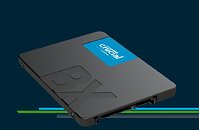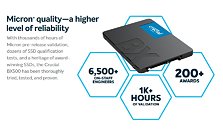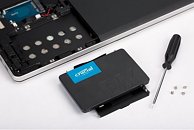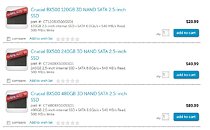Thursday, August 30th 2018

Crucial Announces New BX500 Series of Entry Level SSDs
Crucial has become one of the biggest players in the consumer SSD market due to their excellent price/capacity/performance ratios (their SSDs consistently score highly in our own resident wizard's reviews for some reason, after all). Now, the company is looking to lower price/GB even more as it launches the BX500 series to the market - available in capacities of 120 GB, 240 GB and 480 GB using Micron 3D NAND chips.
Yes, it's a SATA III SSD. And yes, the SATA III connector really is a limiting factor in this SSD's performance - but remember that SATA III controllers are much less costly than NVMe implementations. Sequential performance is rated for up to 540MB/s read and 500MB/s write (4K performance is sadly absent). The whole plethora of usual SSD technologies are here as well - multi-step data integrity algorithm, thermal monitoring, SLC write acceleration, active garbage collection, TRIM support, self-monitoring and reporting technology (SMART) and error correction code (ECC)... For the pricing, these are likely of the DRAM-less variety of SSDs, which means SLC caching is of utmost importance for performance. But pricing really is some of the lowest ever - Crucial is quoting $29.99 for the 120 GB model, $49.99 for the 240 GB one and $89.99 for 480 GB worth of BX500 storage. Crucial will start shipping out orders on August 31st.
Sources:
Crucial BX500 Manual, Crucial BX500 Landing Page, via Tom's Hardware
Yes, it's a SATA III SSD. And yes, the SATA III connector really is a limiting factor in this SSD's performance - but remember that SATA III controllers are much less costly than NVMe implementations. Sequential performance is rated for up to 540MB/s read and 500MB/s write (4K performance is sadly absent). The whole plethora of usual SSD technologies are here as well - multi-step data integrity algorithm, thermal monitoring, SLC write acceleration, active garbage collection, TRIM support, self-monitoring and reporting technology (SMART) and error correction code (ECC)... For the pricing, these are likely of the DRAM-less variety of SSDs, which means SLC caching is of utmost importance for performance. But pricing really is some of the lowest ever - Crucial is quoting $29.99 for the 120 GB model, $49.99 for the 240 GB one and $89.99 for 480 GB worth of BX500 storage. Crucial will start shipping out orders on August 31st.




37 Comments on Crucial Announces New BX500 Series of Entry Level SSDs
B prefix has always been budget. Simple.
I have a BX200 960GB as my gaming HDD in my main PC, it's fine as long as you don't write files larger than 1GB as that's all it had for DRAM cache...after that writes were 70MB/s. Not a big deal as a gaming drive tho. But even so, compared with the WD, the WD is definitely faster and worth the extra $10 IMHO.Really?Exactly this, and for budget drives they're solid. Thank you for taking the time to post constructively! :)
Endurance:
120GB drive: 40TB Total Bytes Written (TBW), equal to 21GB per day for 5 years
240GB drive: 80TB Total Bytes Written (TBW), equal to 43GB per day for 5 years
480GB drive: 120TB Total Bytes Written (TBW), equal to 65GB per day for 5 years
This does indeed suggest it's QLC.
P.S. Did a fresh search of mx500 500gb, there's some for mere 90€ atm!
120GB = $30
240GB = $50
480GB = $80
For reference the MX500 prices are:
120GB = N/A
250GB = $68
500GB = $99
IMO, the only one worth considering is the 480GB. There are cheaper alternatives in the other sizes.
But, yeah, these are budget drives, and I'd rather have capacity over anything else. If the WD Blue 2TB is $340, we should be seeing these DRAMless budget SSDs hitting under $300 for 2TB.
This is consumer level 3D Nand stuff, developed in house by Micron. It’s actually pretty darn good. And affordable. That’s why the MX500 is also reasonable cost.
I have a Samsung 830 EVO 60GB drive used for the System drive and it's only half full. And yes, I have Win 10 Pro x64, Office 2016, iTunes, and a lot of other software installed. In all honestly, even 120GB for a System drive it's a waste.